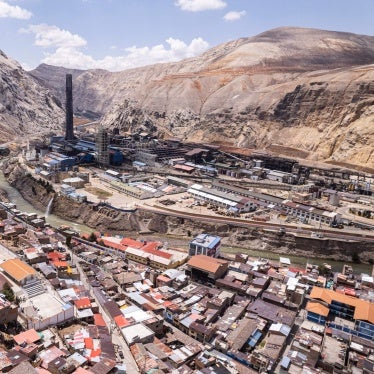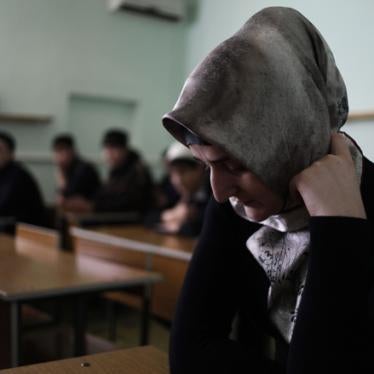(New York) - Former child soldiers and other youth representing a grassroots campaign from around the world will present thousands of symbolic "red hands" to Secretary-General Ban Ki-moon today to demand stronger action by international leaders to end the use of child soldiers.
A UN treaty prohibiting the forced recruitment or use of children under the age of 18 in armed conflict, the Optional Protocol to the Convention on the Rights of the Child on the involvement of children in armed conflict, has been ratified by 126 countries and entered into force on February 12, 2002, a date commemorated annually as "Red Hand Day." But child soldiers are still being used in 15 countries or territories, including some that have ratified the treaty.
"Young people from around the world have joined forces to express their outrage that children are still used to fight wars," said Jo Becker of Human Rights Watch, an organizer of the campaign. "They want a stronger commitment from world leaders to end this practice."
Young people and others from 101 countries have collected more than 250,000 "red hands" - the symbol of international efforts to end the use of child soldiers - as part of a global "Red Hand Day" campaign. They have made red handprints on paper and banners and inscribed personal messages calling for an end to the use of child soldiers. In the eastern Democratic Republic of Congo, where child recruitment has increased dramatically since hostilities escalated in August 2008, children in Uvira and Goma collected over 7,000 red hands. Red hands created by former child soldiers in Guinea and Cote d'Ivoire included messages calling for rehabilitation and reintegration assistance for former child soldiers.
Young people have organized hundreds of events, including marches, petition drives, special exhibitions, public awareness programs at their schools, and other activities to highlight the continued use of child soldiers. Some have delivered red hands to their members of congress or parliament.
"Former child soldiers like me are encouraged to have youth from all over the world standing up for our rights," said Yina Paola Moreno Soto, 20, a former child soldier from Colombia who will participate in the event in New York on February 12. "We hope that world leaders and commanders using child soldiers will pay attention."
Former child soldiers from the Democratic Republic of Congo and Colombia, and youth activists from Germany and the United States will present red hands to Secretary-General Ban Ki-moon at 5 p.m. at UNICEF headquarters, 3 United Nations Plaza (44th and 1st Avenue) in New York. On behalf of the campaign, they are calling for:
- Stronger UN action against governments and armed groups using child soldiers, including Security Council arms embargoes and other sanctions against persistent violators;
- Prosecution of military leaders who recruit or use child soldiers;
- Universal ratification and enforcement of the optional protocol; and
- Increased support for the rehabilitation and reintegration of former child soldiers.
Public events will also take place in other countries:
- In Germany, campaign participants will deliver tens of thousands of red hands to German president Horst Köhler at the Palace Bellevue on February 12;
- In California, students are asking city councils to adopt resolutions declaring February 12 "Red Hand Day" in their cities;
- In Belgium, activists on February 5 presented "red hands" to the Belgian vice prime minister and minister of foreign affairs, Karel De Gucht, at a special event at the the Palais des Académies in Brussels;
- In India, where 35,000 red hands were collected from across the country, activists held a press conference in Pune, near Mumbai.
Red Hand Day Campaign activities have taken place in: Australia, Austria, Belgium, Cambodia, Canada, China, Colombia, Cote d'Ivoire, DRC, France, Germany, Guinea, India, Ireland, Italy, Japan, Liechtenstein, Luxemburg, Madagascar, Nepal, Netherlands, New Zealand, Philippines, Poland, Sierra Leone, South Korea, Spain, Switzerland, Taiwan, Thailand, Turkey, Uganda, United Kingdom, and the United States.
Currently, child soldiers are fighting in at least 15 countries and territories, including: Afghanistan, Burma (Myanmar), Central African Republic, Chad, Colombia, Democratic Republic of Congo (DRC), India, Iraq, Occupied Palestinian Territories, Philippines, Somalia, Sri Lanka, Sudan, Thailand, and Uganda. Eight governments - Burma (Myanmar), Chad, DRC, India, Rwanda, Sri Lanka, Sudan, and Uganda - have signed the treaty, but still use children in their armed forces or support armed groups that recruit children in their territories or neighboring states.
For photos of Red Hand Day Campaign activities, please visit:
http://www.hrwnews.org/redhandphotos/







